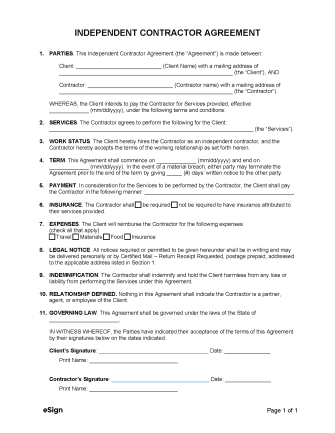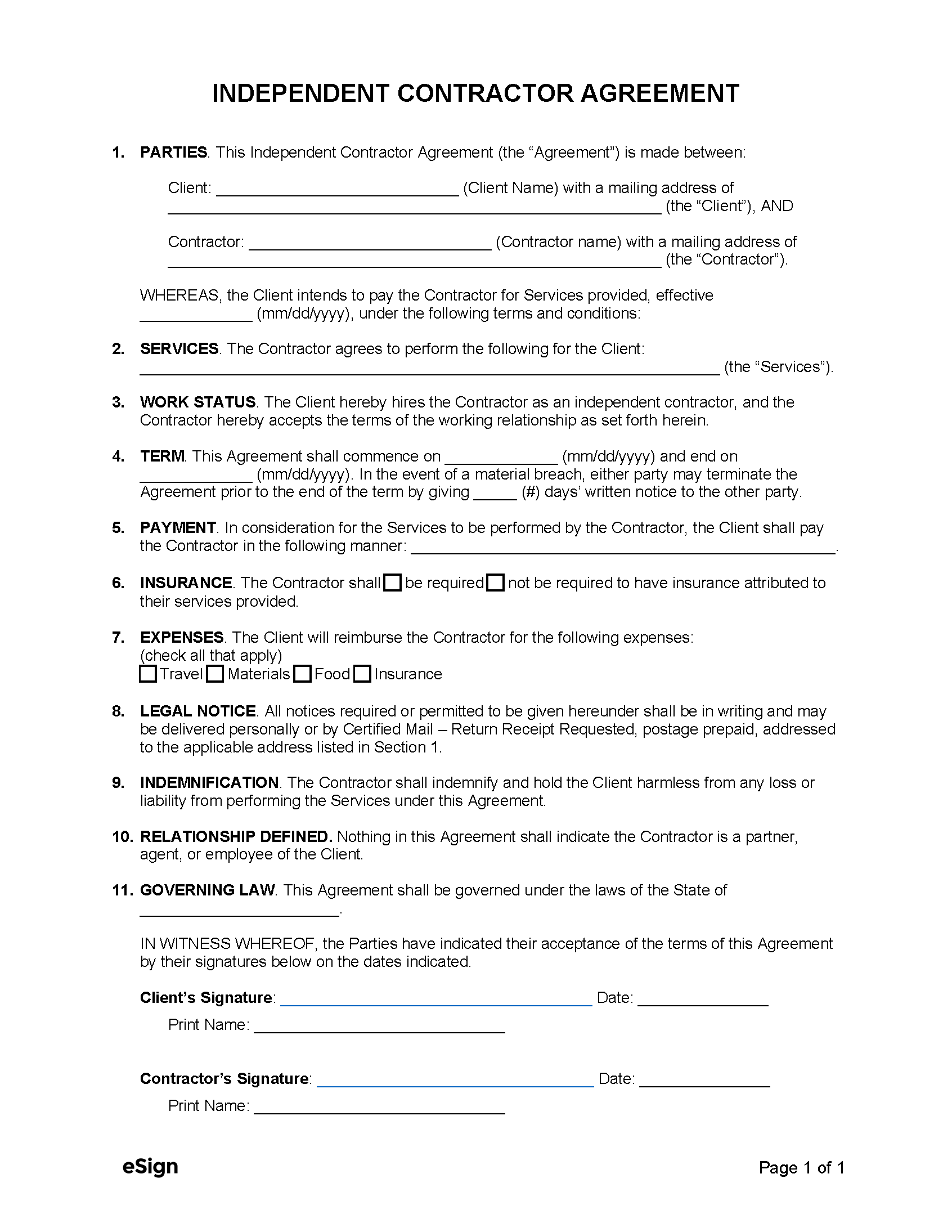Independent Contractor Defined
An independent contractor is a self-employed individual or entity that performs services for a client under the terms of a verbal or written agreement.Among other things, an independent contractor has the authority to:
- Control how their services are provided
- Set their schedule and rate of pay
- Take on as many clients as they see fit
Unlike employees, independent contractors are not entitled to employment benefits (e.g., Social Security, unemployment insurance) and are responsible for withholding their own taxes.
What to Include
- Party Details. The agreement will name the contractor and the client and provide the mailing addresses where invoices and correspondence can be sent.
- Term. The one-page contract must state the dates the contractual relationship begins and ends. It will also set the number of days notice a party must provide before ending the contract due to a material breach.
- Services. In the form, a service description will outline the contractor’s general work responsibilities.
- Compensation. The compensation section will indicate the amount the client must pay the contractor for their services and how they will be paid.
- Expenses. The agreement should also list whether the client is responsible for reimbursing the contractor’s travel, materials, food, or insurance expenses.
- Signatures. The contractor and client must sign and date the agreement for it to become effective.
Sample
Download: PDF, Word (.docx), OpenDocument
INDEPENDENT CONTRACTOR AGREEMENT
1. PARTIES. This Independent Contractor Agreement (the “Agreement”) is made between:
Client: [CLIENT NAME] with a mailing address of [CLIENT ADDRESS] (the “Client”), AND
Contractor: [CONTRACTOR NAME] with a mailing address of [CONTRACTOR ADDRESS] (the “Contractor”).
WHEREAS, the Client intends to pay the Contractor for Services provided, effective [MM/DD/YYYY], under the following terms and conditions:
2. SERVICES. The Contractor agrees to perform the following for the Client: [DESCRIBE SERVICES] (the “Services”).
3. WORK STATUS. The Client hereby hires the Contractor as an independent contractor, and the Contractor hereby accepts the terms of the working relationship as set forth herein.
4. START DATE. The term of this Agreement shall commence on [MM/DD/YYYY] and end on [MM/DD/YYYY]. Either party may terminate the Agreement before the end of the term by giving [#] days’ written notice to the other party.
5. PAYMENT. In consideration for the Services to be performed by the Contractor, the Client shall pay the Contractor in the following manner: [PAYMENT].
6. INSURANCE. The Contractor shall ☐ be required ☐ not be required to have insurance attributed to their services provided.
7. EXPENSES. The Client will reimburse the Contractor for the following expenses: [REIMBURSEMENTS] (leave blank if no reimbursed expenses).
8. LEGAL NOTICE. All notices required or permitted to be given hereunder shall be in writing and may be delivered personally or by Certified Mail – Return Receipt Requested, postage prepaid, addressed to the applicable address listed in Section 1.
9. INDEMNIFICATION. The Contractor shall indemnify and hold the Client harmless from any loss or liability from performing the Services under this Agreement.
10. RELATIONSHIP DEFINED. Nothing in this Agreement shall indicate the Contractor is a partner, agent, or employee of the Client.
11. GOVERNING LAW. This Agreement shall be governed under the laws of the State of [STATE NAME].
IN WITNESS WHEREOF, the Parties have indicated their acceptance of the terms of this Agreement by their signatures below on the dates indicated.
Client’s Signature: ________________________ Date: [MM/DD/YYYY]
Print Name: [CLIENT NAME]
Contractor’s Signature: ________________________ Date: [MM/DD/YYYY]
Print Name: [CONTRACTOR NAME]

